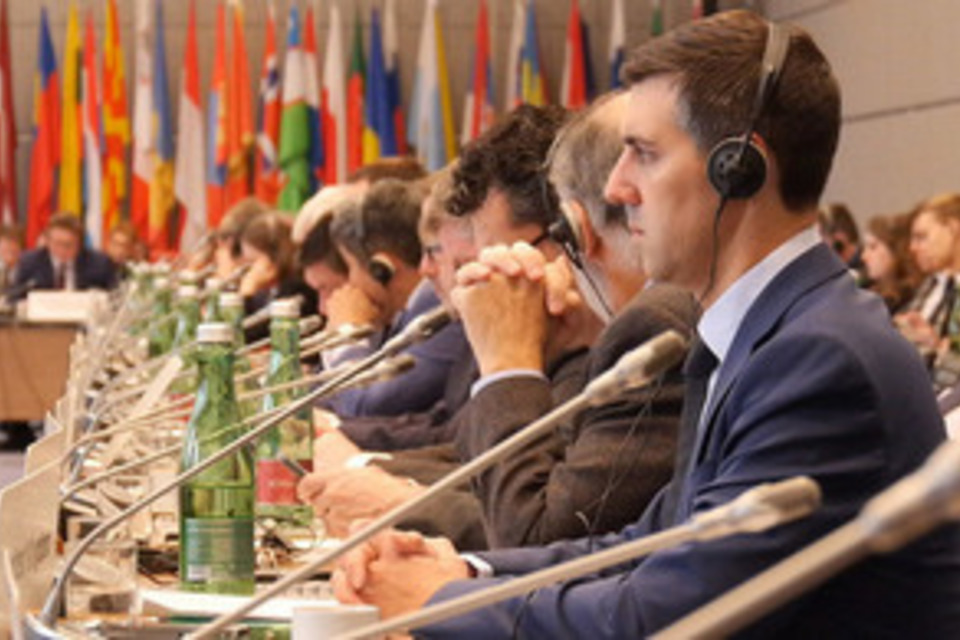OSCE Annual Security Review Conference 2021: UK opening statement
Ambassador Neil Bush sets out UK priorities for the OSCE at this year's Annual Security Review Conference (ASRC) opening session.

Thank you, Madam Chair, thank you Ulrika. I would like to begin by adding my thanks to you, Foreign Minister Linde, your able team and the OSCE Secretariat for organising this year’s Annual Security Review Conference. It has been a particular challenge to get us to this important point and I and the UK are grateful to you.
The OSCE exists to make us all safe and secure. The 57 participating States here today created the OSCE together and accepted a comprehensive set of values, norms and principles that span three dimensions, including respect for sovereignty, territorial integrity, non use of force and human rights and fundamental freedoms.
All are key OSCE principles we have agreed to abide by. So, when one state decides that the rules do not apply to them, we all become less safe and less secure.
Unfortunately, Russia’s actions – such as their refusal to respond to Ukraine’s legitimate request under Vienna Document Chapter 3 for information about Russia’s extraordinary military build-up – show that they have precious little interest in the transparency and confidence building tools of the OSCE.
Furthermore, Russia’s ongoing aggression towards Ukraine and violation of OSCE principles there, remains the biggest security challenge facing our region. We join the overwhelming majority of participating States in reiterating our support for the sovereignty and territorial integrity of Ukraine within its internationally recognised borders, including its territorial waters.
It is in responding to this conflict where the OSCE continues to demonstrate its enduring value. We highly commend the OSCE Special Monitoring Mission and its dedicated staff for their impartial, facts-based reporting. Sadly, however, the Mission is prevented from being able to truly fulfil its mandate because of systematic access restrictions imposed by the Russia-backed armed formations and because it is denied access to Crimea. We repeat our call on Russia to cease its financial and military support to armed formations in eastern Ukraine, bring restrictions on the SMM to an end, implement the Minsk agreements and end its illegal annexation of the Autonomous Republic of Crimea and the City of Sevastapol.
Sadly, it is not only in Ukraine where people living in the OSCE region are suffering the negative impact of conflicts and we strongly support the OSCE’s work in supporting conflict affected populations and promoting conflict resolution. We highly value the work of the Personal Representative of the Chairpersonship in Office on the conflict governed by the Minsk Conference, the Minsk Group Co-Chairs, the work of the OSCE Special Representative on the South Caucasus, the OSCE Mission to Moldova and the OSCE Special Representative for the Transnistrian Settlement Process. All are playing an important role and we are grateful to them.
The UK remains committed to our existing Conventional Arms Control and military confidence and security building measures. To be effective, all participating States must fully and faithfully implement the commitments they have undertaken. Modernisation of the Vienna Document, supported by 45 participating States at Tirana, is the best, first step for those serious about increasing reciprocal transparency and reducing risk.
We again call on Russia to constructively engage in this important and long overdue task. We continue to value the Structured Dialogue as an additional, informal platform for discussion of priority security challenges and risks, and thank Spain for their continued able Chairpersonship, including for the inclusion of climate change and security in this crucial year for global efforts to address the climate challenge.
I am grateful to the Swedish Chairpersonship for putting their faith in me to continue chairing the Security Committee this year. The UK shares the importance placed by the Chair on preventing and tackling transnational organised crime, and this topic has also formed a core focus of the Security Committee’s work throughout the year. I look forward to moderating tomorrow morning’s session on transnational threats, which will have a specific focus on transnational organised crime. With the expertise of the invited speakers, I hope that we can use this session to build upon the discussions that we have had in the Security Committee this year.
As we mark the 10th anniversary of OSCE Ministerial Council Decision 3/11 on the conflict cycle, we are looking forward to the upcoming discussion of the OSCE’s conflict cycle toolbox. We hope to build on discussions at this year’s conflict cycle seminar on how to achieve equal and meaningful participation of women at all levels of decision making and at all stages of the cycle. This work is critical to achieving sustainable peace.
Madam Chair, I hope our discussions over the next two days will remind us all of the value of our shared commitments. In order to successfully address key challenges and seize key opportunities we must make full use of the OSCE’s platforms, instruments and institutions, engaging constructively and in good faith. It is about political will. In a consensus based organisation, political will needs to exist in all OSCE Capitals. Let me conclude by underlining the UK’s strong commitment to the OSCE, and by pledging our continued support to Sweden’s Chairpersonship.